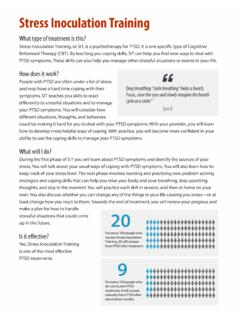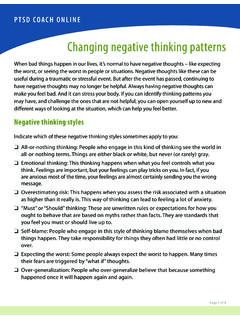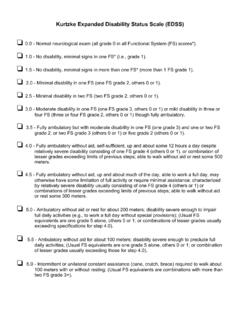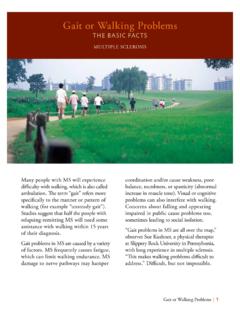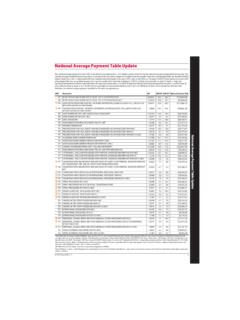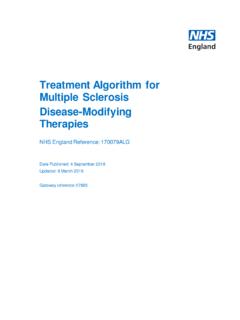Transcription of Brief Trauma Questionnaire - PTSD: National Center for ...
1 Brief Trauma Questionnaire (BTQ) Version date: 1999 Reference: Schnurr, P., Vielhauer, M., Weathers, F., & Findler, M. (1999). The Brief Trauma Questionnaire (BTQ) [Measurement instrument]. Available from URL: This page intentionally left blank Brief Trauma Questionnaire The BTQ is a Brief self-report Questionnaire that is derived from the Brief Trauma Interview (Schnurr et al.)
2 , 1995). (Information about the reliability and validity of the BTI is provided in Schnurr et al., 2002). The BTQ was originally designed to assess traumatic exposure according to DSM IV but specifically asked only about Criterion (life threat/serious injury) because of the difficulty of accurately assessing (subjective response) in a Brief self-report format. Criterion has been eliminated from the PTSD diagnostic criteria in DSM-5, so the BTQ provides a complete assessment of Criterion A. The Questionnaire may be used to determine whether an individual has had an event that meets the A Criterion, or to determine the different types of Criterion A events an individual has experienced. In either case, exposure to an event should be scored as positive if a respondent says yes to either: life threat or serious injury for events 1-3 and 5-7; life threat for event 4; serious injury for event 8, or; Has this ever happened to you?
3 For events 9 and 10. Information about the BTQ appears in the following articles: Koenen, , De Vivo, I., Rich-Edwards, J., Smoller, , Wright, , & Purcell, (2009). Protocol for investigating genetic determinants of posttraumatic stress disorder in women from the Nurses Health Study II. BMC Psychiatry, 9 (article 29). Kubzansky, L. D., Bordelois, P., Jun, H. J., Roberts, A. L., Cerda, M., Bluestong, N., & Koenen, K. C. (2014). The weight of traumatic stress: A prospective study of posttraumatic stress disorder symptoms and weight status in women. JAMA Psychiatry, 71, 44-51. Lancaster, , Melka, , & Rodriguez, (2009). A factor analytic comparison of five models of PTSD symptoms. Journal of Anxiety Disorders, 23, 269-274. Morgan, , III, Doran, , Steffians, G., Hazlett, G.,& Southwick, S. (2006). Stress-induced deficits in working memory and visuo-constructive abilites in special operations soldiers.
4 Biological Psychiatry, 60, 722-729. Morgan, , III, Hazlett, G., Wang, S., Richardson, , Jr., Schnurr, , & Southwick, (2001). Symptoms of dissociation in humans experiencing acute, uncontrollable stress: A prospective investigation. American Journal of Psychiatry, 158, 1239-1247. Morgan, , III, Rasmusson, , Winters, B., Hauger, , Morgan, J., Hazlett, G., & Southwick, (2006). Trauma exposure rather than posttraumatic stress disorder is associated with reduced baseline plasma neuropeptide-Y levels. Biological Psychiatry, 54, 1087-1091. Schnurr, , Spiro, A. III, Vielhauer, , Findler, , & Hamblen, (2002). Trauma in the lives of older men: Findings from the Normative Aging Study. Journal of Clinical Geropsychology, 8, 175-187. Whealin, , Batzer, , Morgan, III, Schnurr, ,& Friedman, (2007). Cohesion, burnout, and past Trauma in Tri-Service medical and support personnel.
5 Military Medicine, 172, 266-272. Page 1 of 2 BTQ (1999) National Center for PTSD Brief Trauma Questionnaire The following questions ask about events that may be extraordinarily stressful or disturbing for almost everyone. Please circle Yes or No to report what has happened to you. If you answer Yes for an event, please answer any additional questions that are listed on the right side of the page to report: (1) whether you thought your life was in danger or you might be seriously injured; and (2) whether you were seriously injured.
6 If you answer No for an event, go on to the next event. Event Has this ever happened to you? If the event happened, did you think yourlife was in dangeror you might beseriously injured? If the event happened, were youseriouslyinjured? 1. Have you ever served in a war zone, or have you ever served in a noncombat job that exposed you to war-related casualties (for example, as a medic or on graves registration duty?) No Yes No Yes No Yes 2. Have you ever been in a serious car accident, or a serious accident at work or somewhere else? No Yes No Yes No Yes 3. Have you ever been in a major natural or technological disaster, such as a fire, tornado, hurricane, flood, earthquake, orchemical spill? No Yes No Yes No Yes 4. Have you ever had a life-threatening illness such as cancer, a heart attack, leukemia, AIDS, multiple sclerosis , No Yes No Yes N/A 5. Before age 18, were you ever physically punished or beaten by a parent, caretaker, or teacher so that: you were very frightened; or you thought you would be injured; or you received bruises, cuts, welts, lumps or other injuries?
7 No Yes No Yes No Yes 6. Not including any punishments or beatings you already reported in Question 5, have you ever been attacked, beaten, or mugged by anyone, including friends, family members or strangers? No Yes No Yes No Yes 7. Has anyone ever made or pressured you into having some type of unwanted sexual contact? Note: By sexual contact we mean any contact between someone else and your private parts or between you and some else s private parts No Yes No Yes No Yes 8. Have you ever been in any other situation in which you were seriously injured, or have you ever been in any other situation in which you feared you might be seriously injured or killed? No Yes N/A No Yes 9. Has a close family member or friend died violently, for example, in a serious car crash, mugging, or attack? No Yes N/A No Yes 10. Have you ever witnessed a situation in which someone was seriously injured or killed, or have you ever witnessed a situation in which you feared someone would be seriously injured or killed?
8 Note: Do not answer yes for any event you already reported in Questions 1-9 No Yes N/A N/A Page 2 of 2 BTQ (1999) National Center for PTSD

